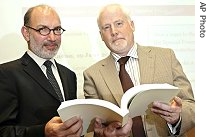2007年VOA标准英语-Human Rights Experts Call for Strong Protection(在线收听)
Geneva
09 May 2007
The human rights organization, Amnesty International, has presented an appeal from 147 countries to the United Nations to maintain an independent and effective system of human rights experts. A petition signed by more than 12,500 people calling for stronger measures to help victims of human rights abuse was presented to the president of the UN Human Rights Council in Geneva on Wednesday. Lisa Schlein reports for VOA.
Amnesty says the so-called system of special procedures is under threat, with a number of countries trying to get the UN Human Rights Council to do away with the current system of independent experts.
The experts monitor the human rights records of countries such as Myanmar, the Democratic Republic of Congo and Cuba. They investigate alleged incidents of torture, arbitrary detentions and disappearances around the world. They report their findings to the Council, which adopts resolutions aimed at protecting victims of abuse.
Golden Misabiko is a human rights activist from Congo. He says he personally benefited from the special procedures.
Misabiko says the first time the UN special rapporteur for Congo, Roberto Garreton, came to Kinshasa, he told the government he was looking for Golden Misabiko who was reported missing. Thanks to the UN expert's intervention, Misabiko says he was eventually released from prison where he says he had been held, tortured and starved.
 |
| Secretary General of Amnesty International's Canadian section, Alex Neve (r) presents the petition to President of the UN Rights Council Luis Alfonso de Alba |
"These proposals, if accepted, would render the special procedures considerably less effective," said Alex Neve. "There is also a proposal that the mandate holders be elected by member states of the Human Rights Council. In our opinion, and on the basis of other elections to human rights bodies that we see at the UN, this would result in a politicization of the process and the selection of individuals who would not be sufficiently well-qualified or independent."
The President of the UN Rights Council, Mexican Ambassador Luis Alfonso de Alba, says he is not worried about the dangers facing the special procedures system or the experts, known as mandate holders.
"I can reassure you that we are working for the strengthening of the system," said Luis Alfonso de Alba. "And, I, as president, I do not see a major threat today. I have a greater level of confidence at this stage that we will be able to strengthen the system, to maintain and strengthen it."
De Alba says he believes a resolution maintaining the integrity of the special procedures system will be adopted unanimously during the next session of the Council in June.